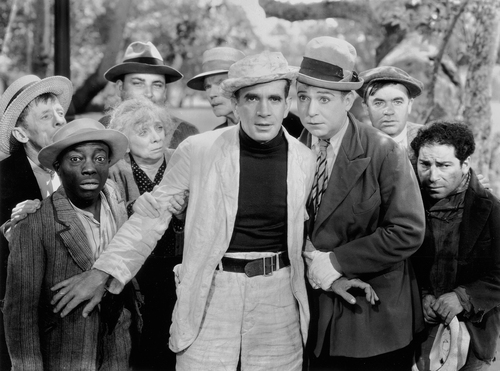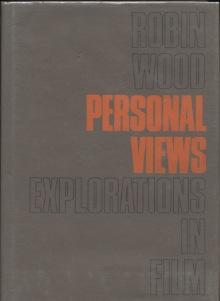From the Chicago Reader (August 30, 1996). — J.R.

This eccentric and soulful anarcho-leftist utopian fantasy is probably the most underrated of all Depression musicals. Directed by Lewis Milestone in 1933 from a script by Ben Hecht and S.N. Behrman and with a score by Rodgers and Hart that features rhyming couplets, the film stars Al Jolson as a Central Park hobo who actually likes being homeless — until he falls in love with an amnesia victim (Madge Evans) who’s a former mistress of the mayor (Frank Morgan) and has to get a job to support her. The overall conception may owe something to Chaplin’s City Lights, released two years earlier, but the remarkable editing and mise en scene show Milestone at his most inspired and inventive. (There’s a parodic Eisensteinian montage cut to the syllables of “America” that has to be seen to be believed, and a tracking shot past muttering customers in a spacious bank is equally brilliant and subversive.) Harry Langdon is memorable as a Trotskyite who sternly lectures the hero, and Richard Day’s deco art direction is striking. Jolson’s most memorable numbers include the title tune and “You Are Too Beautiful,” one of the loveliest of all Rodgers and Hart ballads. Read more
I suspect that the easiest money I’ve ever made in my
entire life as a writer was the year I mainly supported
myself, 1974-75, during my fifth and final year of living
in Paris, by writing capsule film reviews for a monthly
magazine in English called Oui — a joint publishing
effort of Hugh Hefner in Chicago and Daniel Fillipachi
(the publisher of Lui and, for a long stretch in the 1960s,
Cahiers du Cinéma) in Paris. At a time when I was struggling
to make ends meet -– my inheritance money having run
out, and my other freelance jobs being few and far
between -– my life was virtually saved by Terry Curtis Fox,
a Chicago-based associate editor of Oui, who engaged
me to write reviews for the magazine on a regular basis.
If memory serves, this paid $50 a review (a fortune
at the time), and I could pretty much select which films
I wrote about as long as the two-page section of the magazine
called “Prevue” could meet its monthly “tits and ass”
quotient with its illustrations, which the magazine gathered
on its own. So I wound up writing about the latest films of
Jacques Rivette, Robert Bresson, Carmelo Bene, Maurice
Pialat, Alain Resnais, and everything else I could find that
interested me, usually averaging two or three reviews per
issue, starting off with the latest films of Alain Robbe-
Grillet and Marco Ferreri in their May 1974 issue. Read more
From Film Quarterly (Summer 1980). –- J.R.

PERS0NAL VIEWS: EXPL0RATI0NS IN FILM
By Robin Wood. London: Gordon Fraser. 1976.

It’s a pity that Robin Wood’s first collection of essays, published in England four years ago, has had to wait this long to find a US distributor (ISBS, Inc., PO Box 55, Forest Grove, OR 97116). Very much of a transitional work between Wood’s justly celebrated auteurist monographs (on Hitchcock, Hawks, Bergman, Penn and Satyajit Ray) and his recent, more ideologically based film studies. Personal Views: Explorations in Film inevitably loses some of its intended impact by arriving here out of sequence. And for those like myself who feel that the essays in this volume do not represent Wood’s work at its strongest — weighted, as many of them are, more toward the adoption of certain positions than toward their subsequent implementations (and other consequences) — they are more often useful as “stepping stones,” in establishing the backgrounds of some of Wood’s current arguments, than they are as independent studies in their own right.
In broad terms. what this book chronicles in some detail is Wood’s discovery of –and engagement with – some of the theoretical issues in film theory that were being broached in Screen in the early seventies, including those which directly challenged many of the pre-suppositions of his own earlier work. Read more



